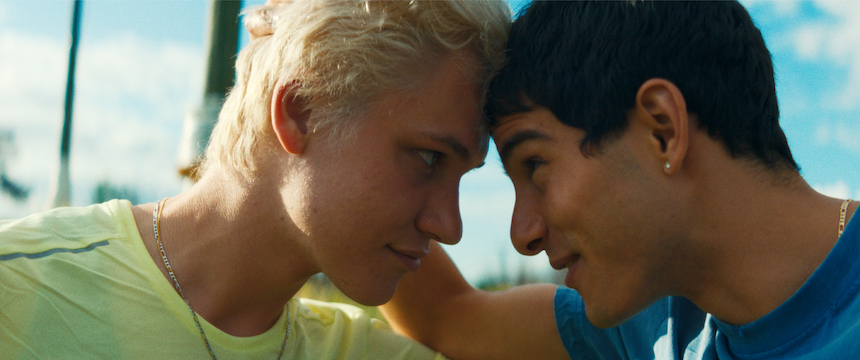Cannes 2024 Review: BLOCK PASS Sees Friendship and Masculinity Under the Microscope
Antoine Chevrollier's debut feature film navigates the emotional landscape of teenage life, exploring themes of masculinity, parenthood, identity, and the societal pressures of a small-town upbringing.

French director Antoine Chevrollier navigates the turbulent waters of adolescence, masculinity, and the confines of small-town life in his feature debut Block Pass. Known for his work on series such as The Bureau, Baron Noir, and the award-winning Oussekine, Chevrollier tackles a coming-of-age narrative in his first feature outing.
Set against the backdrop of Longué-Jumelles, the village where Chevrollier himself grew up, Block Pass explores the dynamics of friendship and the suffocating grip of societal expectations through the lives of two teenage boys. Shot in the Anjou region, the film is a portrayal of the village's insular culture, where societal norms and bigoted prejudices remain deeply entrenched.
Chevrollier's direction in Block Pass is reminiscent of his earlier work, where he often focused on personal narratives set against broader socio-political backdrops. In Oussekine, for example, Chevrollier explored the tragic real-life story of Malik Oussekine, a young man who died in police custody in 1986. This blend of personal and political is significant for Chevrollier's style, and Block Pass continues in this vein by delving into themes of toxic masculinity, social exclusion and family dynamics.
Block Pass offers an incisive examination of male relationships and the often-overlooked emotional vulnerabilities of young men. While French cinema has a rich tradition of exploring coming-of-age stories, Chevrollier's film brings a fresh perspective by focusing on the intersections of sport, masculinity, and friendship. At the heart of Block Pass is the relationship between Willy (Sayyid El Alami) and Jojo (Amaury Foucher).
Torn between his passion for motocross and the expectations of his widowed mother Sévérine (Florence Janas), Willy is a young man on the brink of adulthood, grappling with unresolved grief and the need for acceptance. Jojo is a more daring counterpart, navigating his own challenges, including the pressure from his father David (Damien Bonnard) to excel in motocross.
Chevrollier handles the evolving dynamic between the central BFFs, particularly as Willy discovers Jojo's secret relationship. The director avoids the typical pitfalls of melodrama, instead opting for a more restrained and empathetic approach. The film's exploration of homophobia and social exclusion highlights the internal and external conflicts faced by the characters in a small town.
The dynamics of the central pair are further explored through their contrasting family backgrounds, which profoundly affect their lives. While Willy’s widowed mother wishes to move on in life, Jojo’s father projects his unfulfilled desires in professional motocross onto his son.
Though Block Pass follows familiar coming-of-age tropes, Chevrollier, who co-penned the script with Bérénice Bocquillon and Faïza Guène, shifts the focus from burgeoning sexuality to its social impact (both positive and negative), alongside teenage anguish and rebellion. By extending the conflict to family dynamics rather than confining it to the central duo, the film stands apart from the usual fare of coming-of-age dramas.
However, the scriptwriters populate the story with too many supporting and episodic characters, branching the narrative into several plotlines that do not necessarily intertwine, ballooning the running time to 104 minutes. This expansive storytelling might be a relic of Chevrollier’s episodic career, as the film's structure resembles that of a television drama.
Nevertheless, Block Pass resonates with the universal themes of friendship, identity, and the quest for self-acceptance. Chevrollier demonstrates what a masculine-oriented coming-of-age story can look like, serving as a counterpoint to the past Scandinavian wave that centred on female aspects of growing up.
Contrary to the American bromedies, Block Pass showcases a higher sensitivity to male vulnerability, insecurities, and emotions, while directly addressing the impact of (and absence of) father figures. This nuanced portrayal adds depth to the narrative, allowing the film to explore the complexities of youthful masculinity.
The film debuted in the Critics' Week program at the 2024 Cannes Film Festival.







